
UTAR Faculty of Business and Finance (FBF) hosted the official launch of the Asia-Pacific Applied Economics Association (APAEA) on 8 November 2017 at Kampar Campus.
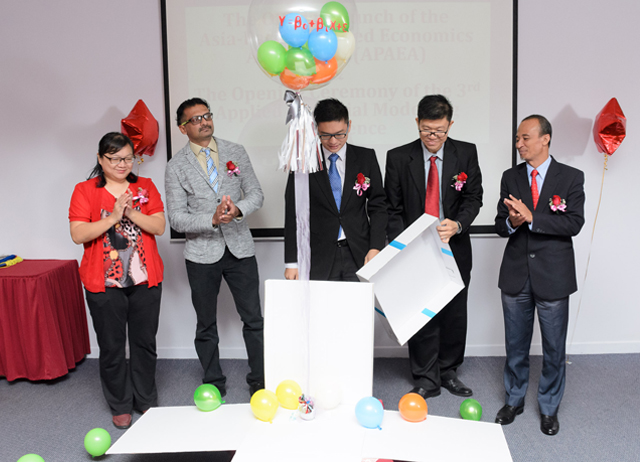
From left: Dr Au Yong, Prof Paresh, Wa, Prof Choong and Dzalin during the launching ceremony
Founded in 2017, APAEA is a not-for-profit association that holds annual meetings, with aims to provide forum and resource base for developing research capacity and to collaborate with academic and non-academic institutions in the region to jointly host conferences and workshops associated with special issues of respected field journals.
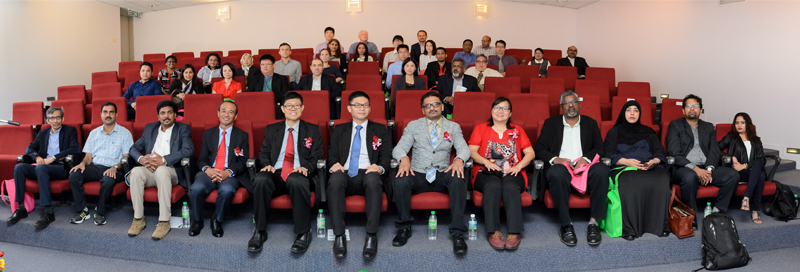
A group photograph to mark the ceremony
The official launch of APAEA was officiated by the Special Officer to Deputy Minister of Finance Daniel Wa Wai How representing Deputy Minister of Finance Malaysia, Dato’ Lee Chee Leong. He was accompanied by UTAR Vice President for Student Development and Alumni Relations Prof Dr Choong Chee Keong representing UTAR President Ir Prof Academician Dato’ Dr Chuah Hean Teik, APAEA President Alfred Deakin Prof Paresh Narayan, Deputy President of Operation of International Centre for Education in Islamic Finance (INCEIF) Dzalin Ayuband UTAR FBF Dean Dr Au Yong Hui Nee.
In conjunction with the official launch of APAEA, UTAR with APAEA also co-organised the 3rd Applied Financial Modelling Conference from 8 to 9 November 2017. Themed ‘The Importance of Commodity Markets in Financial and Macroeconomic Stability’, the 3rd Applied Financial Modelling Conference was a great platform for thought sharing on research finding and networking on commodity markets, energy economics, including energy funding and energy econometrics.
The conference saw the participation of about 30 academics from United Kingdom, Australia, New Zealand, India, China, Pakistan and Malaysia.
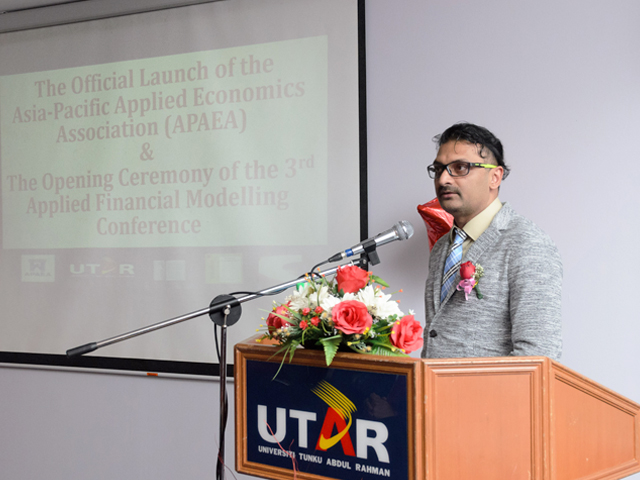
Prof Paresh explaining the roles of APAEA
As the President of the newly launched APAEA, Prof Paresh briefly introduced APAEA and its roles as well as the benefits of APAEA to all the participating academics. He explained, “The APAEA’s key aim is to provide a forum and resource base for developing research capacity of researchers in the Asia-Pacific region, with a particular focus on applied econometrics and Islamic finance and economics research. The APAEA’s aim is supported by the regions central banks and other financial institutions. In addition to that, the association also aimed to collaborate with universities in the region to jointly host conferences and workshops associated with economics and finance.” He added, “Interested researchers and institutions are encouraged to join the association by attending its conferences or by applying to the association for membership.”
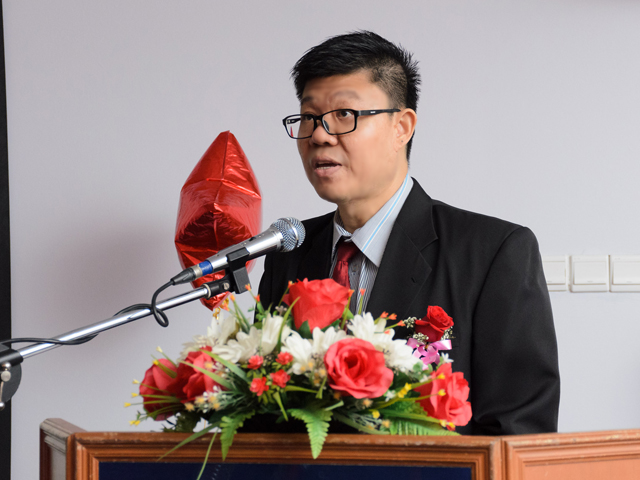
Prof Choong emphasising the importance of APAEA to participants
In his address, Prof Choong said, “With the launching of APAEA, I believe researches will be more than just to give knowledge and solutions to students and academics, but I anticipate that multiple researches will also be carried out, especially in the Asia-Pacific region. This will also lead to the expansion of opportunities for various universities, organisations and research institutions to collaborate with APAEA and with each other on diversified topics, in this case, on topics of finance and economics. APAEA initiatives and strong focus in research field are also well supported by UTAR. As a university that places great emphasis on researches, UTAR believes that active researching and cross-international researches with other parties are vital for students and academics to gain broader knowledge and help solve global issues.It is delighted to also know that APAEA is a strong advocate for women’s participation in research by offering research grants to them, which I believe will also open up many ideas and perspectives towards research.”
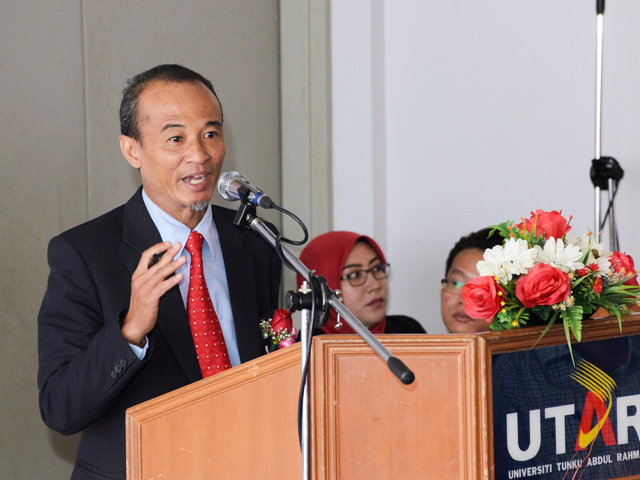
Dzalin stressing the importance of quality research outputs toward industry
Dzalin in his speech enthused that, “As the world’s first and only university dedicated to Islamic Finance, INCEIF is committed to delivering talent and expertise for the growing global industry. Backed by a faculty that comprises pioneering academicians and industry players who jointly address issues relating to innovation and leadership within the industry, INCEIF ensures its academic programmes and graduates stay at the forefront of the industry. To achieve this aspiration, we require the support from everyone, be it from the financial industry, the academia or the man on the street, to build this legacy of sustainable, distinctive excellence alongside us.”
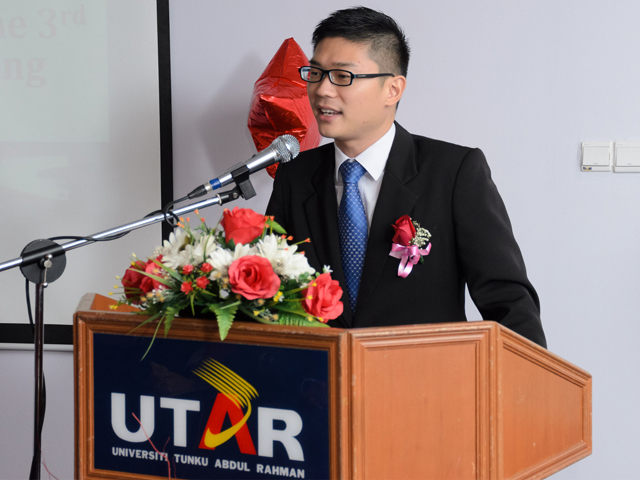
Wa gracing the launching ceremony
In his opening speech, Wa said, “It is indeed a great pleasure for me to be here to mark this auspicious yet meaningful launching of APAEA and the opening ceremony of the 3rd Applied Financial Modelling Conference. I was told that the conference delegates attending today come from a multitude economic and applied financial disciplines. I believe it will be an eye-opening experience to be present among the esteemed speakers, local and international participants, academicians, practitioners and researchers today, as we come together to discuss and exchange ideas and knowledge.” He added, “The launching of APAEA is indeed a good opportunity for academics, researchers and higher learning institutions to network, organise conferences as well as to discuss and learn new insights from other researchers and their research outcomes from all over the world. I strongly believe that today’s conference will provide productive discussions throughout the day among all the participating scholars.”
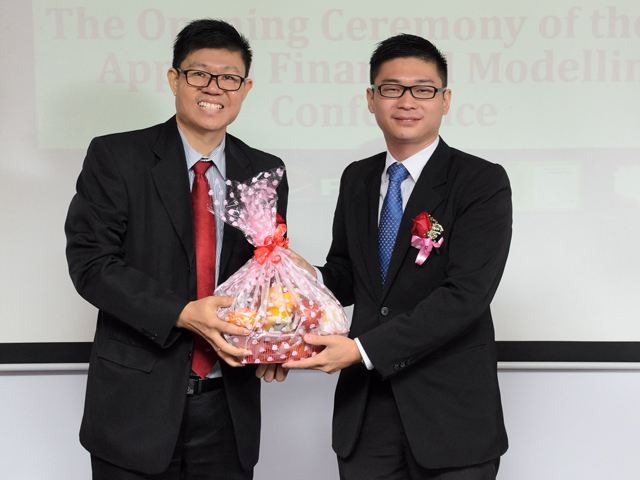
Prof Choong (left) presenting a token of appreciation to Wa
Structured as a key initiative in providing a significant opportunity for researchers and academics to present their research findings, the conference saw the submission of about 30 papers.
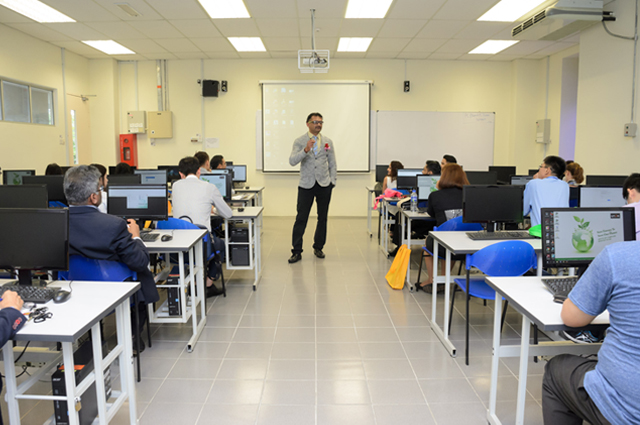
Prof Paresh delivering his keynote address
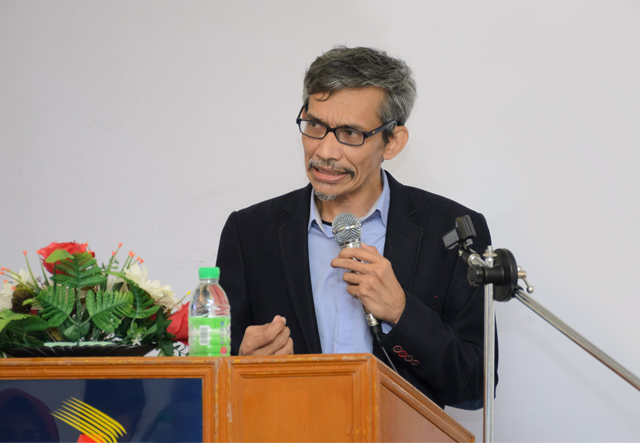
Prof Mansor delivering his knowledge on macro-financial
Professor of Finance and Econometrics of INCEIF Prof Dr Mansor Hj Ibrahim and Prof Paresh were the keynote speakers and presented their talk titled “Oil and Macro-Financial Linkages” and “Islamic Stock Sensitivity to Oil Prices and Economic Significance” respectively.
Among other topics covered at the 3rd Applied Financial Modelling Conference were “Managing COP21 using a Stock and Oil Market Integration Index”, “Understanding Corporate Debt for Global Energy Firms”, “Disaggregated Economic Growth and Energy Use Relationship: Evidence from OECD Countries”, “Do Country Risk and Financial Uncertainty Matter for Energy Commodity Futures?”, “Human Capital and Energy Consumption Nexus: Evidence from India”, “Terrorism and Commodity Prices: An Exploratory Study”, “The Effects of Recent Terrorist Attacks on Risk and Return in Commodity Markets”, “An Analysis of Time-Varying Commodity Market Price Discovery”, “Commodities Futures Market Failure: Evidence from Diammonium Phosphate”, “Volatility and Bilateral Exports of Malaysia”, “The Wavelet Coherency Analysis of Time-Varying Relationship between Oil Prices and Geopolitical Risk”, “Oil Prices Shocks, Trade Intensity and Business Cycle Synchronization”, “Electricity Futures and Stock Market Response to Electricity Sector Material Disclosures”, “Electricity Production Mix and the EKC Hypothesis: Evidence from 18 OECD Countries”, “Determinants of Power Spreads in the Liberalized Electricity Markets”, “Behaviour of Oil Prices and Stock Markets: Evidence from Asia and Arab Nations”, “A Market Efficiency Index for Energy Futures Based on the Term Structure”, “Evaluating the Hedging Performance of Malaysian Crude Palm Oil Futures Contract: Insights into the Segmentation of Bull/Bear Market”, “Crude Oil Price Uncertainty and Corporate Investment: New Global Evidence”, “Sharia Compliant Stocks Are Efficient and Outperform?”, “A Time-Varying Analysis on the Weak-Form Efficiency of Crude Oil Prices”, “Bond Return Predictability: The Role of Commodity and Other Factors”, “A Looming Revolution: Implications of Decentralised Electricity Generation and Self-Consumption for Suppliers”, “Risk Exposure and Market Efficiency”, “Can Energy Levy Reduce Air Pollution Induced from Energy Consumption?”, “Is Oil Price Important to Biofuel Investment: Insights from Asymmetric Modelling”, “Effects of Oil Price Movement on Nigerian Macroeconomic Variables: Evidence from Linear and Nonlinear ARDL Modelling”, “Financial and Economics Antecedents of Carbon Emissions: A Dynamic Heterogeneous Panel Estimation Study of ASEAN-5 Countries”, and “Panel Evidence on the Ability of Oil Returns to Predict Stock Returns in the G7 Area”.
© 2019 UNIVERSITI TUNKU ABDUL RAHMAN DU012(A).
Wholly owned by UTAR Education Foundation Co. No. 578227-M LEGAL STATEMENT TERM OF USAGE PRIVACY NOTICE